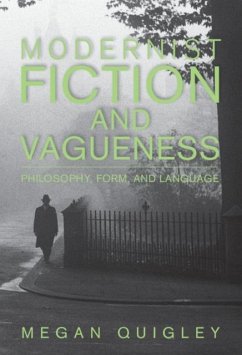Modernist Fiction and Vagueness marries the artistic and philosophical versions of vagueness, linking the development of literary modernism to changes in philosophy. This book argues that the problem of vagueness - language's unavoidable imprecision - led to transformations in both fiction and philosophy in the early twentieth century. Both twentieth-century philosophers and their literary counterparts (including James, Eliot, Woolf, and Joyce) were fascinated by the vagueness of words and the dream of creating a perfectly precise language. Building on recent interest in the connections between analytic philosophy, pragmatism, and modern literature, Modernist Fiction and Vagueness demonstrates that vagueness should be read not as an artistic problem but as a defining quality of modernist fiction.
Dieser Download kann aus rechtlichen Gründen nur mit Rechnungsadresse in A, B, BG, CY, CZ, D, DK, EW, E, FIN, F, GR, HR, H, IRL, I, LT, L, LR, M, NL, PL, P, R, S, SLO, SK ausgeliefert werden.


